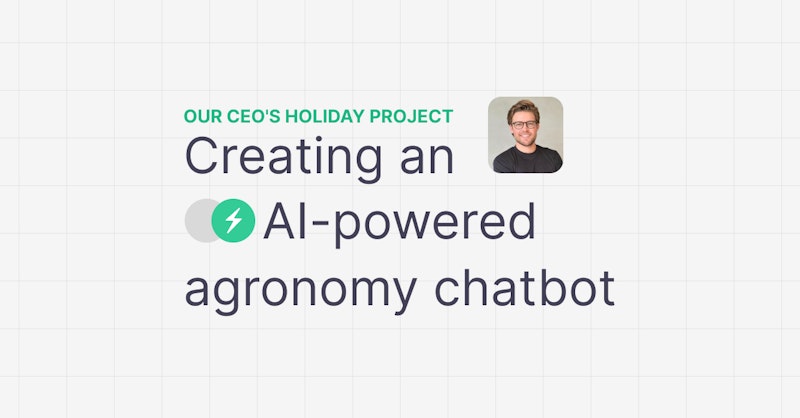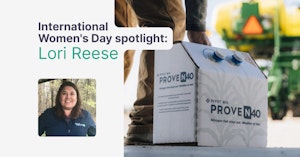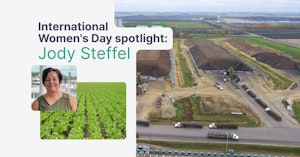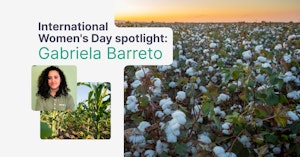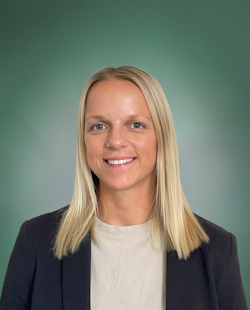The holiday season is a fantastic time of year for rest, quality time with family, setting resolutions, and for those with a curious and creative spirit, taking on a new project. And that’s exactly what our entrepreneurial CEO (Bailey Stockdale) got up to over the holidays with some interesting findings to share about creating an agronomy chatbot.
In 2023 the role of artificial intelligence (AI) in agriculture was a hot topic and an obvious trend that sparked many discussions. There are already many ways AI is being used in agriculture but there are still many unknowns and uses to explore. Fascinated by the idea of an agronomy chatbot as an application of AI in agriculture, Bailey set out to demonstrate how this could look.
It’s important to note that Leaf has no current plans to offer this as a product and is a proof of concept at this stage, but the demo code is all open-sourced so anyone can access it. Now onto the findings:
Project #1: talk to your fields
And now on to holiday projects.
— Bailey Stockdale (@gbstockdale) December 30, 2023
Up first: talk to your fields! Retrieve data from your farm (via Leaf) and ask questions about it.
Demo video below and you can get the code/try it here: https://t.co/BkM7aCdHeS
Next: buy https://t.co/qZJbnamk0S and add Leaf widgets to auth. pic.twitter.com/z4NrJL9Abv
‘Talk to your fields’ is a concept where you can ask an AI chatbot questions about your raw data (field operations like planting, applications, harvest and tillage); the model will construct queries to Leaf's API, retrieve the data and display it in a human-readable format. In Bailey’s project, the chatbot he created was able to answer questions such as “Which field was most recently planted?”, “Which variety was planted” and “When did the operation begin and end?”. I’m sure growers would love to ask questions about machine performance, costs and other indicators and get an answer without having to dig too deep into the raw data.
But as Shane Thomas explores in his recent Upstream Ag Professional newsletter, there are limitations to consider for the use of Large Language Models (LLMs) in agronomy. One limitation is that the effectiveness of AI chatbots for agronomic questions depends on the specificity of the prompts, where context and the many farming variables (such as weather, location and variety) are very important when making an agronomic decision. Another factor to consider is the proficiency of the model and how well the model has been trained, which leads us to Bailey’s second project on benchmarking.
Project #2: benchmarking LLMs' ability to answer agronomic questions.
Holiday project #2: benchmarking different LLMs' ability to answer agronomic questions.
— Bailey Stockdale (@gbstockdale) January 3, 2024
Right now it is just multiple choice CCA exam questions, but I'd like to expand it to include free form short answer questions.
Next: train model & top leaderboardhttps://t.co/OOUyGln7kJ pic.twitter.com/JWiXhEmzaJ
By setting up benchmarking, we can determine which AI models best answer agronomic questions. Bailey’s second project assesses the model’s ability to answer multiple choice CCA exam questions as a proof of concept and in the results you can see how each model performed. Bailey hopes that a leaderboard encourages faster improvement of the models and mentioned that he might try free-form questions soon too. He has also been working on training the models with agronomy textbooks and a benchmarking tool like this helps validate whether training has improved accuracy.
Project #3: creating the first open-sourced agronomy AI model
In summary, Bailey has provided a proof of concept for an agronomy chatbot and found a way to benchmark model accuracy. Making an agronomy chatbot tool could already be made a reality, but there are some limitations to work through before using it with confidence. Leaf doesn't plan to offer these projects as products at this stage, however the code is open-sourced, extending an invitation to all curious minds in agtech to explore further (talk to your fields, benchmarking & the open source agronomy AI model). Perhaps it can be your next New Year project!
